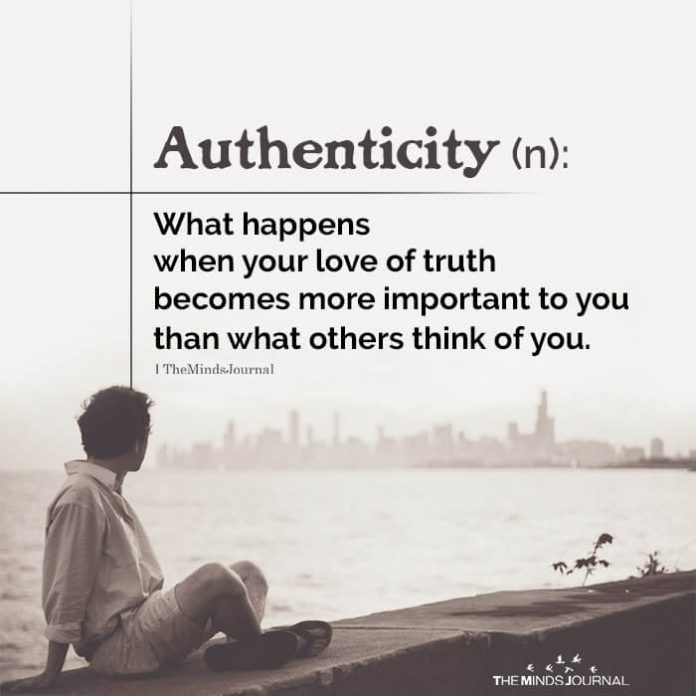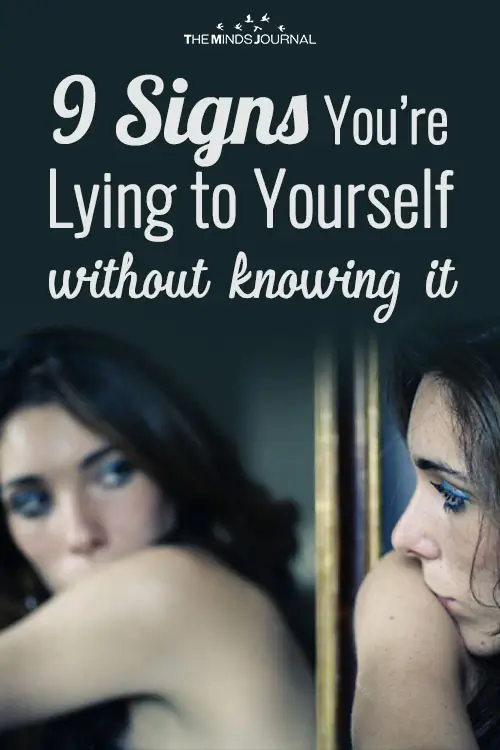Lies are a little fortress; inside them, you can feel safe and powerful. Through your little fortress of lies, you try to run your life and manipulate others. But the fortress needs walls, so you build some. These are the justifications for your lies. You know, like you are doing this to protect someone you love, to keep them from feeling pain. Whatever works, just so you feel okay about the lies. – William Paul Young
Dishonesty is a trait that most of us have no problem pointing out in others.
We feel a sense of anger, disgust, and mistrust towards those who try to deceive us. In fact, deception is such a dishonorable quality to us that we spend large amounts of our time reading about shady politicians and watching shows that center around lying and cheating characters. Secretly, it feels good to point the finger at others because it makes us feel morally righteous.
But here’s the truth:
at the end of the day, most of us fail to see that we also lie – to ourselves – frequently.
Sadly, most people aren’t willing to explore their hidden tendencies and face the truth. Deception is such a despicable quality that we would rather disown it than face it honestly. Unfortunately, the more we disown our darker tendencies, the more deeply we bury them within our Shadow Selves, and the more delusional we become. And the more delusional we are, the less mental and emotional clarity we have, which leads to a legion of problems. Some of these problems are life-destroying.
4 Reasons Why We Lie to Ourselves
If deceit is such a contemptible quality, why do we lie to ourselves? Here are a few reasons why:
- It’s comfortable – you don’t have to face the hard truth.
- It’s convenient – you can keep doing the same thing without having to change anything.
- It makes you feel better about yourself (preserves self-esteem).
- It helps you to avoid self-responsibility for your actions.
For example, a man who cheats on his wife may justify his actions by saying, “If only she had given me more affection and love, I wouldn’t have strayed.” This justification, of course, is a form of self-deception because it prevents the man from fully coming to terms with what he has done. Furthermore, lying to himself helps him to preserve the belief that he’s a “good and faithful” person.
Read How Accepting Things You Cannot Change Makes You Finally Free To Be Yourself
Examples of Self-Deception
The following examples might help to deepen your understanding of self-deception more. See if you can relate to any of these examples:
Example 1:
A woman gets a high-paying attorney job at a popular firm. After months in her job, she begins to experience chronic illness and panic attacks. Convinced that she’s just going through a bout of bad health, she continues working in her high-stress job until she has a nervous breakdown.
Example 2:
A man is in a relationship with a woman who he believes is his soulmate. The man continues to believe that the woman loves him, even after she has repeatedly told him that she wants to break up.
Example 3:
A student is preparing for a college exam. He finds himself frequently procrastinating and keeps telling himself that he’s “not in the mood to study.” He then takes the exam and fails. In reality, he was procrastinating because he was scared of the pressure that comes with good grades.
Example 4:
A woman has joined a local church. She loves hearing sermons about love, acceptance, and compassion. But after the ceremonies, she observes that the fellow churchgoers are judgmental, racist, and narrow-minded. She turns a “blind eye” to the behavior of these people, convincing herself that she is on the “right moral path.”
Example 5:
A man decides to become a monk. He believes that his choice comes from the desire to live a religious life. In reality, his choice comes from the desire to escape his problems.
Example 6:
A couple loves to travel. But it isn’t traveling to other countries that they really enjoy; it is escaping from their inner sense of emptiness.
Example 7:
An entrepreneur keeps being offered amazing opportunities to expand her business, but she turns them all down. She keeps saying, “I don’t have time,” and “I have too much work.” The truth is that she’s scared to expand because she lacks self-confidence.
9 Signs That You’re Lying to Yourself

Are you lying to yourself? Answering this question can be hard because our self-deception is so often unconscious.
But if you suspect that you might be lying to yourself, congratulate yourself! It takes a tremendous amount of courage and self-awareness to even entertain the possibility. It can be scary to own up to the fact that you might be deceiving yourself, but this honesty will take you far on your spiritual path.
Read 12 Tips To Self-Love And Compassion
Here are some signs you should look out for:
1. You feel like you’re running away from something.
It’s hard to admit … but you feel like you’re trying to escape something; maybe a thought, a realization, a harsh truth? Something is lurking in the darkness, and you don’t like it. You feel the need to escape, but you don’t know why.
2. You keep justifying other people’s behavior.
In order to evade the truth, you find yourself making excuses for other people and their bad behavior. For example, you might tell yourself that your emotionally abusive husband is just “blowing off steam from work” or that your backstabbing friend “just made a stupid mistake.” Justifying other people’s behavior is much easier than facing the truth and making hard decisions.
3. You keep justifying your behavior.
“I didn’t hurt him, I just taught him a lesson,” “I don’t hate my career, I’m just feeling a little stressed,” “I can’t move, I have no other option,” “I’m not terrified of moving out of my comfort zone, I’m just busy with commitments.”
Self-justification is deceptive: on one hand, it makes us believe that we have a “good reason,” but on the other hand, that reason is blatant bullshit. Unconsciously we know that we’re just making excuses, but consciously we’re oblivious.
4. You have a rigid attitude.
You cannot accept blame or responsibility for anything that has happened, instead, other people are always to blame. This tendency to perceive yourself as always being right, and others as always wrong, hides a tremendous amount of fear.
Beneath the narrow-mindedness, you’re secretly afraid of answering to the truth, so in an attempt to escape reality, you form rigid mental barriers and point the finger at others.
5. You feel inauthentic.
You can’t seem to shake the feeling that you’re a “fake” or “sham.” Inside of you, there is a sense that you’ve lost touch with who you really are. You go places you don’t want to go to. You make friends with people you don’t like. You buy things you can’t afford. You laugh when the joke isn’t funny.
You don’t know what makes you happy or who you really want to be in life anymore.

6. You prefer to wear rose-tinted glasses.
You prefer to live in a dream world rather than in reality. For example, in your relationships, you project your fantasies onto your partner, believing that everything is fine, even when it isn’t.
The idealist in you believes that you can make everything work out, but your idealism is a form of escapism that obscures the truth. In order to buffer yourself against the harsh realities of life, you prefer to see the world in a naive way.
Read Soul Searching: 19 Signs Of A Lost Soul and How To Uncover Your True Path
7. You don’t like listening to other’s advice.
When a friend, colleague, or family member gives you a fresh perspective on your situation, you immediately close off. Feelings such as anger, sadness, and irritation are triggered within you, often causing you to lash out at the poor soul who dares to help you. Why does this happen?
When you are lying to yourself, you will tend to only favor others who reassure you – not challenge you. Anyone who challenges you, even with the best of intentions, poses a risk of exposing your elaborate self-fabricated lie.
8. You carry around deeply-rooted anxiety.
No matter what you do, you feel a sense of subtle unease and insecurity following you everywhere. This pervasive sense of unease causes you to constantly second-guess yourself and privately wonder if you really are doing the right thing or making the best decisions.
Sometimes this deeply-rooted anxiety may manifest as a sense of guilt that you do not want to face and try to bury.
9. Your heart contradicts your mind.
You keep trying to convince yourself that everything is fine and you’re in control when emotionally, you are a wreck. You might find yourself exploding in anger at others or trying to hide your tears, and you might wonder where such emotions came from.
If you are extremely disconnected from your heart, you might find your emotions manifesting in your body instead. Your mind might believe that everything is peachy when your body is suffering from tension, high blood pressure, infections, and other afflictions.
How to Stop Lying to Yourself
We all lie to ourselves: no one is excluded. In fact, self-deception is part of being human, and in a sense, is necessary for our inner growth.
If you feel embarrassed and uncomfortable about this topic, you’re not alone. I have caught myself in my own web of self-deception many times, and it isn’t an enjoyable experience.
However, for any true inner work to occur, we must all honestly take a look at ourselves. Lies only serve to alienate ourselves from the truth of who we are.
If you think you might be struggling with self-delusion, here are some useful pieces of advice:
1. Journal and write down your true feelings.
Journaling is a safe space that allows you to let out all of your suppressed thoughts and emotions. Don’t hold back anything: go wild. Sometimes it takes a bit of time to fully “unleash the Kraken,” but with patience, you will find this practice invaluable.
2. Honestly examine your fears.
Ask yourself, “What am I running away from?” Take some time to introspect, preferably in solitude. Solitude is easy to create: simply set aside half an hour a day to spend with your thoughts.
If you have a busy schedule, prioritize, and see what other tasks you can shorten. Read more about solitude.
Read What You See First Reveals Your Deepest Unconscious Fear: Visual Personality Test
3. Focus on gaining self-esteem from within yourself.
Often, what triggers self-deception is the desire to please others and gain validation. Notice your tendency to look outside of yourself for your self-worth. Are you relying on others to make you feel special, worthy, or loveable?
Realize how unstable and dangerous gaining your self-worth from others is: at any moment a person could turn against you, and thereby crush your self-esteem. Begin to gain approval from within yourself. Work on loving yourself and embracing who you are.
4. Open up to other people’s points of view.
Different perspectives are always very valuable, even if they aren’t necessarily right. However, often those closest to us have an uncanny way of seeing the truth that we too often can’t perceive. So don’t close yourself off. Listen.
5. Figure out your needs vs. desires.
Needs are always honest, desires can be misleading. What do you truly need? What do your heart and soul crave for? Answer these questions, and you will free yourself from self-deception.
So, after reading this article, what are your thoughts?
Please understand that there’s no need to punish or blame yourself if you do discover that you’re lying to yourself. Most of us lie to ourselves unintentionally as a self-protection mechanism. So treat yourself with kindness. You are not a “bad person”; you are simply a human being with flaws. But now that you’re at least partly conscious of any smokescreens that are enveloping you, you can work to bring more truth into your everyday life.
Written by Aletheia Luna Originally appeared in Lonerwolf












Leave a Reply